SUMMARY
This is AI generated summarization, which may have errors. For context, always refer to the full article.
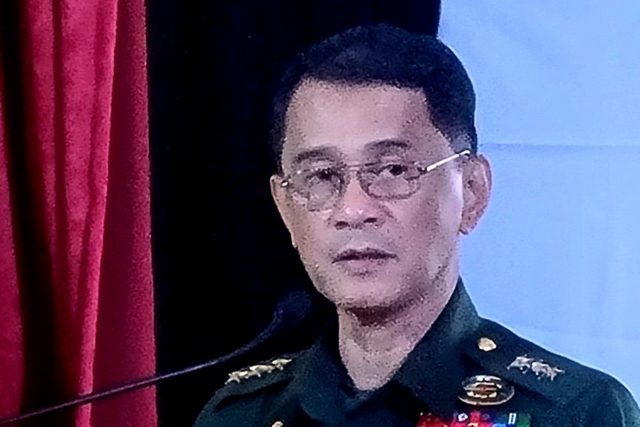
MANILA, Philippines – Lieutenant General Bartolome Vicente “Bob” Bacarro turns 56 years old on Sunday, September 18. His physique these days makes him look like a cadet from the Philippine Military Academy (PMA) from where he graduated more than 30 years ago. He has lost nearly 10 kilograms, following the keto diet since his days as the commander of the Southern Luzon Command (Solcom), his last post before being appointed the 58th chief of staff of the Armed Forces of the Philippines (AFP).
Instead of hanging his military uniform – 56 is the mandatory retirement age in the uniformed service – Bacarro extends his compelling military career by another three years to lead the AFP.
The weight of the position and the duties that come with it is made heavier by the fact that Bacarro becomes the first military chief to serve a fixed three-year term by virtue of Republic Act No. 11709 signed by former president Rodrigo Duterte and the first AFP chief of staff under the second Marcos presidency.
Protector of the people
At his first meet-and-greet with the defense press corps last September 6, we asked Bacarro if serving as the military chief in a Marcos administration weighed on him.
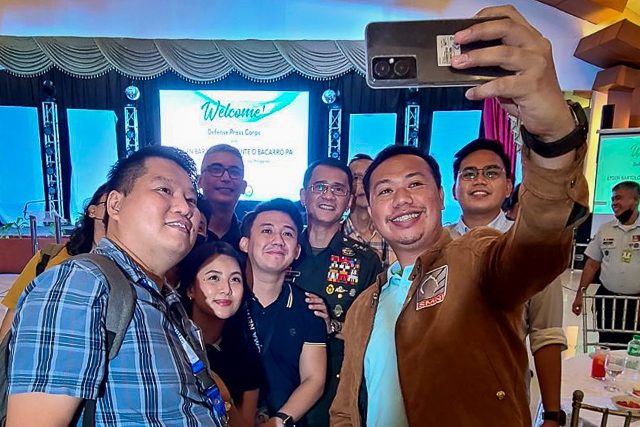
“Regardless of who the president is, very clear ang mandate of the chief of staff,” he said. He and his predecessors follow the same directive, “that is, to keep up with the expectations of the leadership.”
How can he assure the public that they can trust the military now?
The role of the AFP “has not changed, not even a bit,” Bacarro said. “It is stipulated in our Constitution that we are the protectors of our people. Any threat on our kababayan, the AFP, together with the other uniformed services – we will stand in between to protect our people.”
Filipinos, he also said, now have “a better appreciation of what the AFP is doing as manifested by the high trust rating and approval that we are receiving.”
“We attribute it not only to us doing our job but also to people like you [the media] who have put in the open what the Armed Forces of the Philippines is doing, what the AFP is right now,” he added.
In February 1986, the EDSA People Power Revolution ousted the late dictator Ferdinand E. Marcos after a 20-year rule. The PMA cadet corps was ready, if needed, to leave Baguio City to protect the people who had gathered for four uncertain days in EDSA. The country’s premier military school and its cadets were not isolated from the politically-charged atmosphere that time.
Bacarro, a native of San Fernando, La Union, was then on his second year at the academy as a member of the PMA “Marangal” Class of 1988.
Thirty-six years after EDSA, Bacarro was named AFP chief of staff by the President and commander-in-chief, Ferdinand Marcos Jr., son and namesake of the strongman.
In his assumption speech at the change of command ceremonies last August, Bacarro used “unity,” President Marcos’ rallying call during the presidential campaign, as the acronym of his priorities as military chief: “Unparalleled professionalism. Noble utilization of resources. Invigorating capability development. Tenacity in sustaining our gains. Yearning for Service Excellence.”
It’s taken the AFP years to rehabilitate its image after the atrocities carried out by the military during Martial Law, and Bacarro trusts that soldiers today have imbibed the principles of human rights. In fact, he said, the AFP Center for Law on Armed Conflict (CLOAC) has not received any cases of human rights violations “for the longest time.”
Bacarro said the AFP is now focusing on the present and future.
He made it clear that he doesn’t intend to squander the people’s high respect for the AFP these days. “I am looking forward to bringing it up to a higher level and we can only do that if we keep on doing our job, which is securing our people,” he said.
Friend to the media
At the media event held at the officers’ club in Camp Aguinaldo, Bacarro was unsurprisingly comfortable in the company of journalists. He laughed with them over old stories and confidently answered questions fielded to him early in the morning. The press conference started at 8 am.
In his welcome remarks, he described reporters as his “old friends” and said he “would like to meet new friends as we do our job.”
“Ang media very close sa akin (The media is very close to me). My work being the spokesperson [was] contributory to what I am now,” Bacarro said.
He was the Army and AFP public affairs chief and spokesperson from 2004 to 2007. Even then, he already had the bearing of a future military chief. While there were spokespersons more eloquent than him, Bacarro had a presence that made people listen and take notice.
Bacarro was accessible to the press corps. The public affairs office and the press office were right beside each other under the AFP grandstand such that reporters often visited Bacarro and vice versa. Mundane chats eventually led to background, off-the-record information on pressing issues in the AFP.
Those were trying years for the institution. Then-Army chief, and later AFP chief of staff General Hermogenes Esperon Jr. was a loyal ally to then-president Gloria Macapagal-Arroyo who was disliked by the people over corruption allegations and faced destabilization attempts.
Bacarro, a member of the Army Special Forces, was caught in the crossfire between his boss, the media, and public opinion.
These days when media as a legitimate source of news is questioned and attacked, it is a breath of fresh air to hear a high-ranking government official like Bacarro acknowledge the role of journalists in society.
He, too, is wary of how fake news, disinformation, and propaganda can become avenues to “destroy the credibility of the AFP and its commanders.”
He believes that media’s coverage has been instrumental in the high trust and approval ratings enjoyed by the military and the “better public acceptance” the AFP has been receiving the past years.
From Bacarro, who has also had his share of bad news and criticisms, journalists received a “thank you.”
Humility and courage
It’s his self-effacing manner that makes Bacarro liked and respected by soldiers. He’s easy to work with, one staff said. He expects everyone to pursue excellence in any given task but keeps a healthy work environment. He always emphasizes the “individual as well as collective contributions of the soldiers” in serving the people and protecting the country.
In February 1991, Bacarro was a company commander in Isabela when he and his men had a 10-hour encounter with more than a hundred New People’s Army (NPA) rebels who attacked the town of Maconacon. It earned him the Medal of Valor, the highest combat award given by the AFP to soldiers who displayed exceptional courage in battle, risking their lives for others.
As a field officer, he earned numerous combat and non-combat awards.
In 2019, however, when Bacarro was the PMA commandant of the corps of cadets, 4th class cadet Darwin Dormitorio died after being repeatedly hazed by his upperclassmen at the academy. Bacarro resigned his post, citing command responsibility.
Although the Baguio City prosecutors’ office cleared Bacarro of any liability, Dormitorio’s death hounded him when the Commission on Appointments initially deferred his confirmation as Solcom chief.
Challenges and opportunities
Today, Bacarro focuses on the tasks before him. He said that his three-year term as AFP chief of staff presents both challenges and opportunities for him.
“The three years is a challenge. Nobody can deny the fact that it is a challenge. But the thing about having three years, we can come up with policies [and] programs… [and] at the end of the term, [one] will see the fruits of these undertakings,” he said.
It will be unlike before, he said, when the so-called revolving door policy denied military chiefs the chance to see their plans and programs through.
Bacarro’s tenure gives him the unique opportunity to initiate meaningful long-term plans, shepherd the institution in achieving its goals, and continue the military’s modernization program.
It also gives him time to find solutions to urgent problems, such as how to fund the ballooning pension of the military and uniformed personnel, a result of Duterte’s doubling of the soldiers’ base pay.
Like his predecessors, Bacarro vowed to end the communist insurgency by increasing the military’s “operational tempo” against the armed rebels. But he emphasized that the military is facing both internal and external concerns that it should not focus on just one threat. It’s a matter of finding the strategic balance to address all of the country’s security challenges.
In the next three years, Bacarro is one of the most important government officials to watch as his role is crucial in maintaining stability in the country.
Toughened by battles in the field and facing the media, General Bob Bacarro has made his personal mantra what American businessmen John D. Rockefeller and Henry Heinz had said on the secret of success: “Doing the common thing uncommonly well.” – Rappler.com
Add a comment
How does this make you feel?
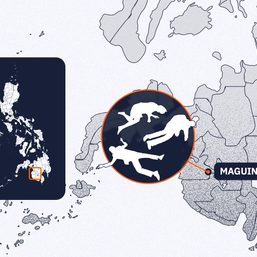
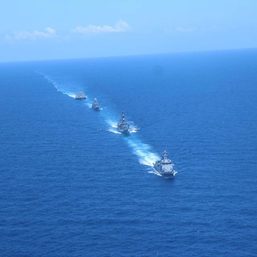
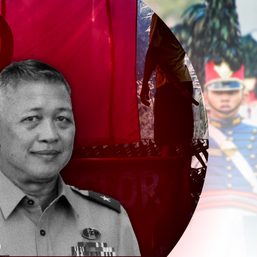
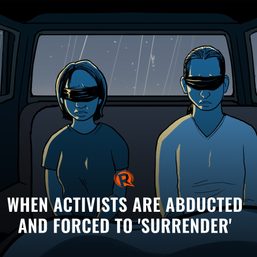
![[ANALYSIS] The sharp power challenge: Defending PH from within](https://www.rappler.com/tachyon/2024/03/sharp-power-challenge-march-5-2024.jpg?resize=257%2C257&crop_strategy=attention)
There are no comments yet. Add your comment to start the conversation.